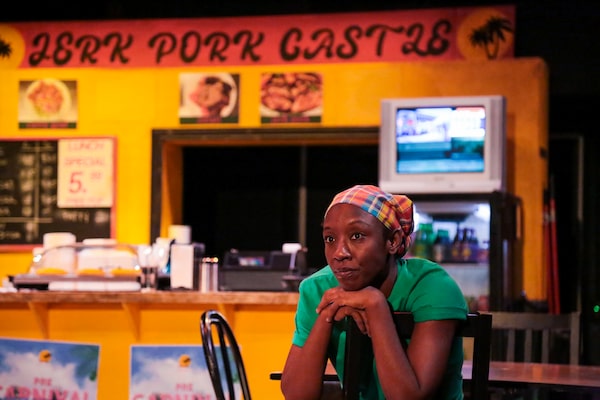
Virgilia Griffith in Our Place.Gesilayefa Azorbo/Supplied
- Title: Our Place
- Written by: Kanika Ambrose
- Director: Sabryn Rock
- Actors: Virgilia Griffith, Sophia Walker
- Company: Cahoots Theatre and Theatre Passe Muraille
- Venue: Theatre Passe Muraille
- City: Toronto, Ont.
- Year: Runs to Dec. 3, 2022
- COVID-19 measures: Masks are required at all performances
Who has a place in Canada and who does not?
A strong new play by Kanika Ambrose, now simmering on stage at Toronto’s Theatre Passe Muraille, explores the question by taking a look at the precarious lives of two undocumented workers slinging jerk pork at a Caribbean restaurant in Scarborough.
Our Place follows Niesha (Sophia Walker) and Andrea (Virgilia Griffith), who came to Toronto on visitor’s visas and are now working under the table, sending money overseas as long they can and hoping to find a path to legal residency.
The two women from the fictional islands of Fanon and Caviva at first seem like total opposites.
Niesha, working hard for the sake of the future of her kids back home, keeps her head down and cards close to her chest; Walker, an 11-season veteran of the Stratford Festival, brings a lot of depth and dignity to the role, and puts a lot of elbow grease into it, almost constantly wiping tables off, mopping the floor or putting chairs up and down.
Andrea, a mother as well, has more zest for the life she’s living here and now. She can perhaps seem too interested in having fun, but she’s also more grounded in her observations about power dynamics than the nervous Niesha. She knows, for instance, that their employer is not just doing them a favour, but keeping costs low by paying them less than the legal minimum.
The truth is that both women are guarded, just in different ways. Andrea may seem to move about more freely, but she does so by adopting personae symbolized by the flashy wigs and outfits she dons for nights on the town. Griffith, a Dora-winning actor, gives a magnetic performance with layers and gets to bring her great comic timing to the part.
Guardedness is necessary when you’re trying to stay under the radar – and when the wrong move with an employer or a landlord or a friend can result in a visit from the authorities.
Our Place primarily dramatizes this aspect of living in an undocumented situation with the way it treats romance – and the way this can further skew relationships between men and women. An eventual marriage proposal could mean a huge shift in circumstances for Andrea or Niesha – and for their children.
Andrea is dating a chill club-going character named Malcolm – and the question of whether he is willing or capable of being more than just a casual partner has more weight that it might otherwise. (Tremaine Nelson, a screen actor here making his theatrical debut, has a natural low-key energy that plays well in the part.)
Meanwhile, Niesha is pursued by a young man named Eldrick (Pablo Ogunlesi) who has started hanging out at the Jerk Pork Castle and hitting on her. He seems like bad news – but he might be very good news. (Ogunlesi is marvellously ambiguous in the role – making Eldrick seem a complex character rather than a cipher, and all the way through.)

Pablo Ogunlesi and Sophia Walker in Our Place.Gesilayefa Azorbo/Supplied
Our Place reminded of the late 19th century and early 20th British dramas about marriage performed at the Shaw Festival in how clearly (and with specific dollar amounts) Ambrose illustrates the economics of courtship in an unequal society.
As to that question of who has a place in Canada, Our Place is set around 2016 during the Syrian refugee crisis – and it’s Andrea who is aghast that the new Prime Minister, Justin Trudeau, is letting in 25,000 refugees from that part of the world while there’s no clear path to citizenship for people from her part of the world who are already here, despite violence also existing back at home and their unskilled labour being in demand.
We see news reports from that time on an old Toshiba television above the take-out counter in one corner of designer Sim Suzer’s detailed but somewhat disconnected set – which places a hotel room at the opposite end of the theatre, left unexplained until the final scenes. (Sabryn Rock is the director of the in-the-round-ish co-production with Cahoots Theatre.)
Ambrose’s decision to have her characters hail from fictional Caribbean islands is intriguing – and explained, in a playwright’s note, as a choice “made to protect the identities and regional origins of people who are currently in precarious work situations.”
Ultimately, this decision adds a welcome theatrical layer to the language of the realistic social drama in that the characters speak in fictional dialects made by blending real ones.
(I was reminded of how fellow Torontonian playwrights Sean Dixon and Nicolas Billon also invented fictional dialects or languages for recent plays – and how I don’t see this much outside of Canadian drama.)
There are times when Ambrose’s play can start to feel a bit like it’s running in circles, covering plot or points already established; this reduces the emotional power of the ending in particular. But with a little tightening, Our Place could easily find a place on stages across the country.